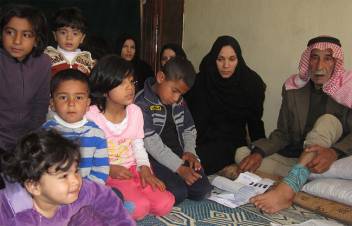 HelpAge International and Handicap International are working together to ensure Syrian refugees living in Jordan receive the essential assistance they need to survive, and to do so with dignity.
HelpAge International and Handicap International are working together to ensure Syrian refugees living in Jordan receive the essential assistance they need to survive, and to do so with dignity.
One of the key challenges facing many Syrian refugees in urban areas of Jordan is that of rising debts. Many Syrian refugees arrive in Jordan with few, if any, resources, having depleted them while still displaced inside Syria or en route to Jordan. The ability of the most vulnerable to make ends meet is limited, as bit by bit, all their coping mechanisms are eroded.
Debt is an indicator of how Syrian families living in urban areas of Jordan – over 50% of all Syrian refugees in the country – are coping economically with the current crisis. If the debt burden of families is increasing, it is an indication that the humanitarian system is not adequately meeting refugees’ basic needs.
Humanitarian response hugely under-funded
The main reason for this is that the response is hugely under-funded. For example, the UNHCR website shows that only 55% of the response is currently covered. NGOs have not received enough money either, which means the problem is getting bigger and bigger.
Family economy is a difficult phenomenon to measure. Most Syrian refugee families have a varied and variable monthly income from a number of sources. While one study suggests that at least one male member was able to find informal work in 44% of families, overall estimates suggest that unemployment is as high as 84% and no women reported earning an income from work outside the house. 18% of families were living off their savings, while 34% of refugee families had no income at all and were wholly dependent on the humanitarian system.
Assessments over the last six months confirm that debt is increasing: 72% of families surveyed in March 2013 were in debt – more than double the rate of last October. Families said they owed money to relatives, neighbours, landlords and shopkeepers, both in Syria and Jordan. Rent accounts for the greatest proportion of household expenditure and maintaining the ability to pay it is the single greatest concern of refugee families.
Debt adds to psychological stress of displacement
Many of the Syrians living outside the camps are in debt to their landlords for rent, some up to three months. The threat of eviction exists and adds an additional psychological stress to families.
Almost all the families surveyed had sold assets such as gold, household goods and property – either to get out of Syria or to be bailed out of the camps. Increasingly, therefore, families have little or nothing in the way of savings or emergency funds to absorb sudden shocks.
The rising debt burden coupled with declining savings and strained borrowing from relatives means that families are forced to adopt negative coping strategies. These include informal, low paying work, reducing the number of daily meals, child labour, begging and transactional sex.
How HelpAge is helping older people and their families
With the money raised from the DEC Syria Crisis Appeal, HelpAge, in partnership with Handicap International, is providing cash assistance over the next three months to older, disabled and other vulnerable refugees living in the urban areas of Jordan. This can be spent on their most pressing needs, such as rent, electricity, clothing, food and healthcare.
By identifying vulnerable families and providing them with immediate and sustained cash assistance, we can bridge the income gap, defer the rapidly growing debt problem and prevent families from being forced to adopt negative coping strategies.
Donate to our sister Age International’s Syria Crisis Appeal.
Find out more about our work with Handicap International to support Syrian refugees in Jordan.
